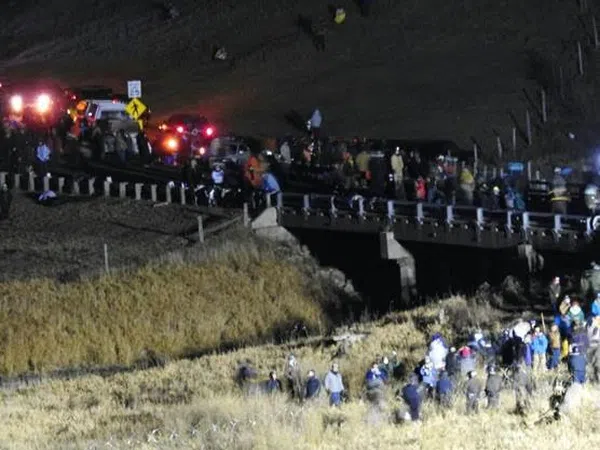
protestors attempt to stop Dakota Access Pipeline construction (Nov. 2021)
BISMARCK, N.D. (NORTH DAKOTA MONITOR) – A federal judge this week allowed 13 more Republican-led states to intervene as co-defendants in the Standing Rock Sioux Tribe’s new lawsuit against the U.S. Army Corps of Engineers.
The lawsuit, filed in October, accuses the Army Corps of unlawfully allowing the Dakota Access Pipeline to operate without an easement, a complete environmental assessment or sufficient emergency spill response plans. The tribe ultimately wants a federal judge to shut the pipeline down.
Standing Rock has opposed the pipeline for years, saying it infringes upon the tribe’s sovereignty, has damaged sacred cultural sites and jeopardizes the tribe’s water supply.
The Army Corps of Engineers has jurisdiction over a part of the pipeline that passes below the Missouri River less than a half-mile upstream from the Standing Rock Reservation.
“The Corps has failed to act and failed to protect the tribe,” Standing Rock Chairwoman Janet Alkire said in an October press conference announcing the lawsuit.
The more than 1,000-mile pipeline, often referred to as DAPL, passes through North Dakota, South Dakota, Iowa and Illinois. Its pathway includes unceded land recognized as belonging to the Sioux Nation under an 1851 treaty with the U.S. government.
North Dakota joined the case on the side of the Army Corps earlier this month, arguing that closing DAPL would cost the state hundreds of millions of dollars in tax revenue, put thousands of jobs at risk, hamper regional supply chains and harm the environment. State attorneys also argue that a federal court order shuttering DAPL would violate North Dakota’s right to regulate its own land and resources.
In a brief filed Monday, the 13 additional co-defendant states made similar arguments. The group, led by Iowa, said DAPL is integral to the health of regional energy and agriculture markets.




Comments